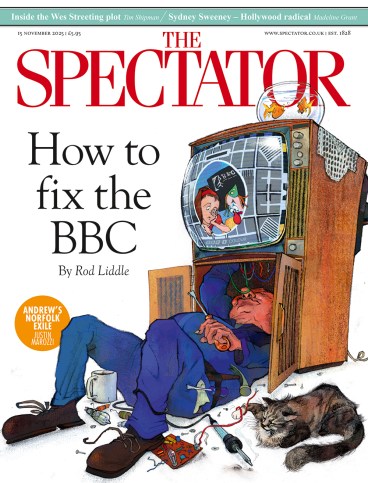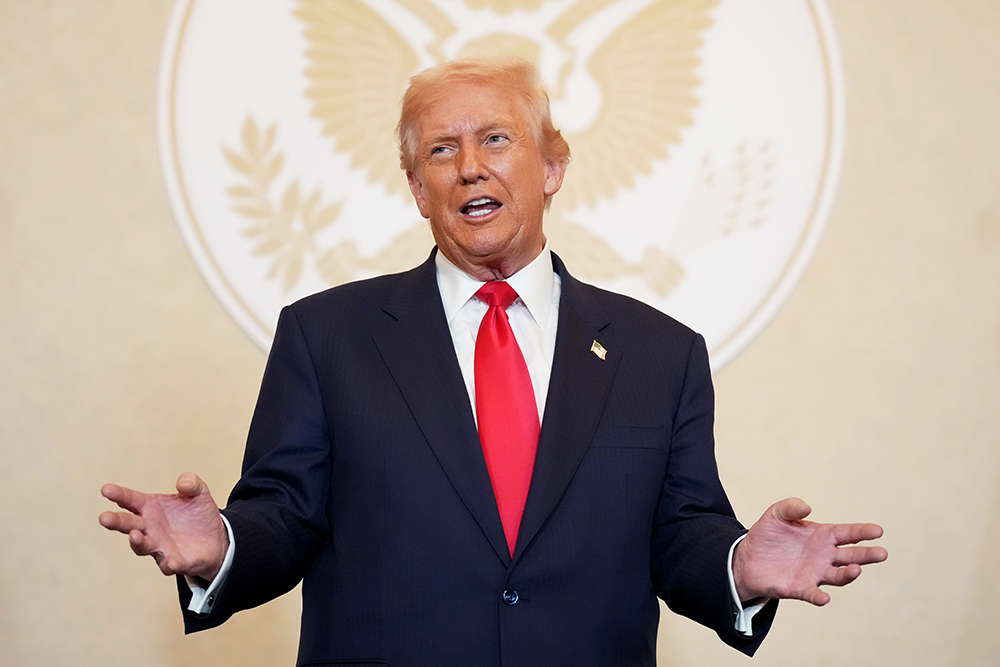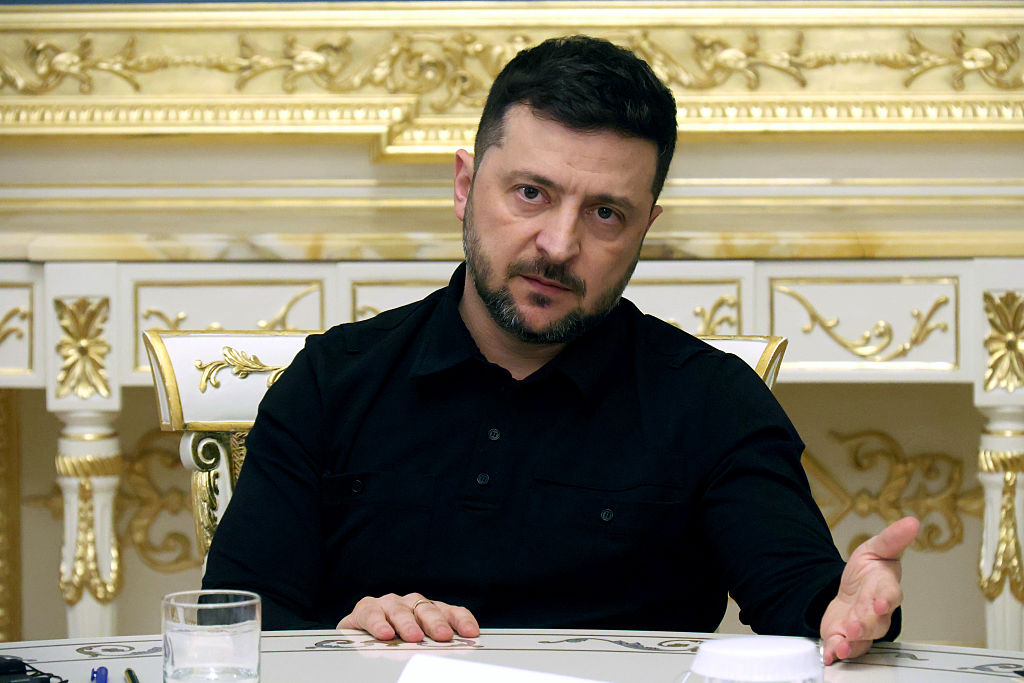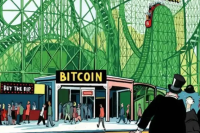
The softening of the Bank of England’s stance on ‘stablecoins’ looks like another tugging of the British forelock towards the Trump regime. Stablecoins are virtual money akin to cryptocurrency, but theoretically safer because their value is pegged to the dollar or other conventional currencies. Often used by investors to buy into crypto, they’re claimed to offer a more efficient future for international payments – but also accused of facilitating crime.
Two years ago, Governor Andrew Bailey decreed that stablecoins did not ‘meet the standards we expect of safe money’; other non-US regulators largely agreed. That well-known crypto player Donald Trump, however, called them ‘perhaps the greatest revolution in financial technology since the birth of the internet’. And since his state visit in September, with Treasury secretary Scott Bessent alongside to lead City discussions, the Bank’s posture has markedly shifted, even as far as potential willingness to act as ‘lender of last resort’ for sterling stablecoin issuers. Has Bailey become a true believer – or is this one more act of obeisance to the American emperor?
Winners take all
I enjoyed debating Elon Musk’s mega-bonus on the radio with the former Greek finance minister Yanis Varoufakis. In essence, if Musk succeeds in driving the value of the Tesla electric car company from $1.4 trillion (already more than most of the global auto industry together) to $8.5 trillion within a decade, by selling millions of AI-packed vehicles and humanoid robots, he’ll receive new shares worth $1 trillion to boost his existing multibillion holding.
I predicted that this self-driving truck of gold will never arrive because both Tesla itself and the brilliant but volatile Musk have a high chance of burning out before delivery. Meanwhile, the fact that three-quarters of Tesla shareholders voted in favour of the award is a sure sign that the top of the tech stock boom is nigh. But one absurd promise (which also happened to be a smart publicity stunt) doesn’t undermine the fundamental value of entrepreneur-led capitalism as a force for progress.
Varoufakis countered that the Tesla deal in fact bears no relation to traditional capitalism, but is an example of ‘cloud-rent’ (he sometimes calls it ‘techno-feudalism’) in which tech barons seek market domination by controlling vast hoards of customer data. In other words, Musk and his ilk are ruthless monopolists. But in their winner-takes-all world, there’s always another megalomaniac, in Silicon Valley or Shenzhen, perfecting the device that will ultimately destroy them.
Bad numbers
As the interminable wait for the Budget drags on, the backdrop against which Rachel Reeves will present her strangulated, other-blaming defence on 26 November looks more dire with every Office for National Statistics bulletin. The latest labour market overview reveals unemployment rising to a post-pandemic peak of 5 per cent, while the provisional estimate for the fall in ‘payrolled employees’ in the year to October is 180,000. Worse, union-driven public-sector pay awards are running at 6.6 per cent per annum (far ahead of 3.8 per cent inflation) compared with 4.2 per cent in the private sector. And almost every bad number is followed, tellingly, by ‘above estimates of a year ago’. Oh Rachel, what have you done – and how much more damage can you wreak before your personal egg-timer of political fate runs out of sand?
Fraternal fortunes
The death of the UK’s richest resident, Gopichand Hinduja, creates a headache for ‘rich list’ editors. Will the £35 billion over which he presided as his family’s patriarch remain intact in the top spot – or will it be carved into multiple slices in a Succession-style scrap? On one side, reportedly, are Gopichand’s sons and younger brothers; on the other, the daughters of his elder brother Srichand, who died with dementia in 2023.
The split dates from a falling out a decade ago over the ownership of the Swiss-based Hinduja Bank – and it’s a sad turn for a family once so united and devout that all its assets were shared in common, in pursuit of higher spiritual objectives that apparently transcended material wealth. Srichand’s mantra from earlier days, ‘Be silent, be generous, be modest’, seems to have fallen by the wayside, while Gopichand’s legacy to London is the distinctly immodest development of the Raffles hotel in Whitehall, which charged me £24 for a single negroni.
Having once lunched with them both, I can confirm that Srichand was as scarily austere as Gopichand was expansively benign; I hope they rediscover fraternal harmony in the next life. But meanwhile, up for promotion from number two on this year’s Sunday Times rich list are another pair of brothers, the metal traders turned property players David and Simon Reuben, who happen to be developing the equally opulent Waldorf Astoria hotel, close to Raffles at Admiralty Arch. There’s a theme here: when it opens next year, I’ll be scanning the cocktail price list for signals of hubris.
Fake news
Departing Lord Mayor Alastair King’s ‘Last Laugh’ (he has handed over to Dame Sue Langley, a doyenne of the London insurance market) was a gala fundraiser at the Guildhall. It kicked off with ‘The Star-Spangled Banner’ heralding the arrival of ‘President Donald J. Trump’ and prompting a table of Chinese bankers near me – unfamiliar with satire, perhaps – to stand rigidly to attention. What followed was a savage impersonation by the Scottish comedian Lewis MacLeod in a MAGA hat. Mobile-phone footage will surely by now have reached the White House. Fresh from his assault on the BBC, let’s hope the President doesn’t claim the last laugh for himself by imposing swingeing new tariffs on City financial services.








Comments